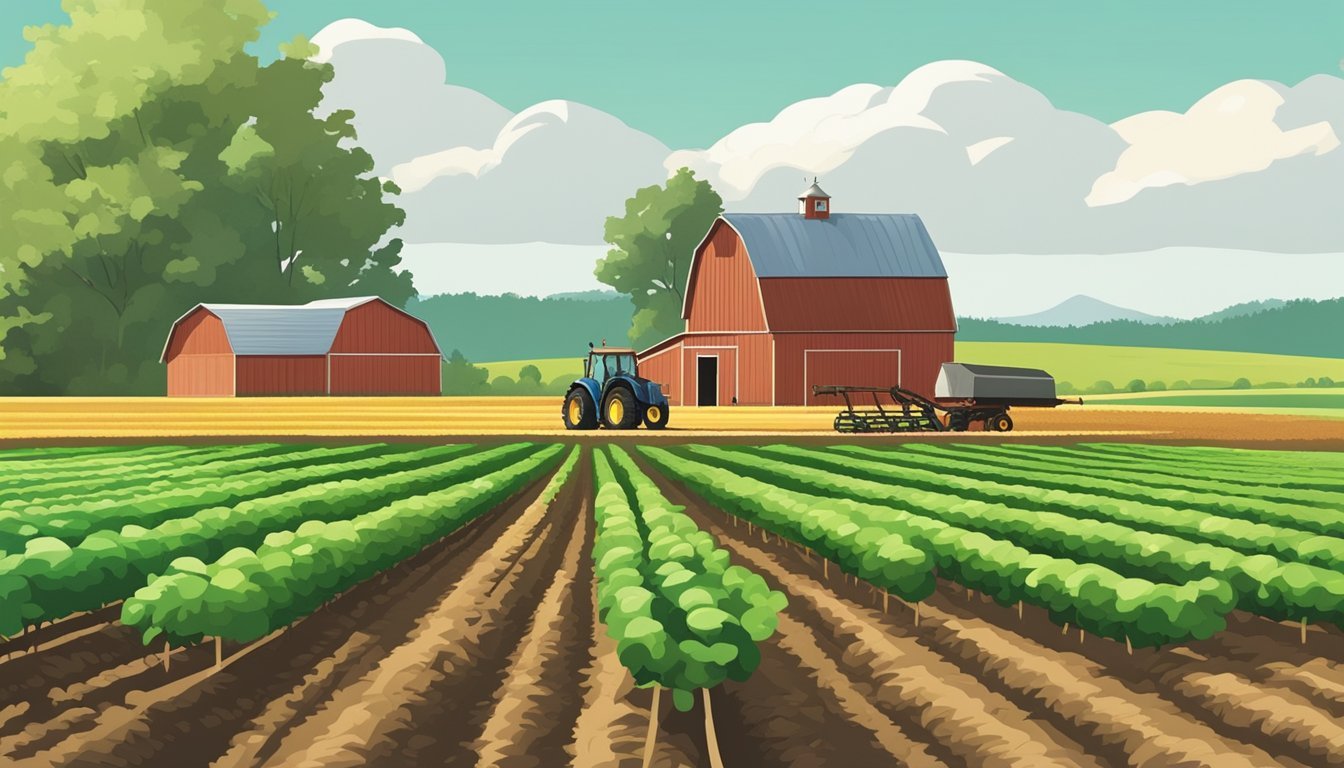North Carolina Farm Land for Lease
Opportunities and Considerations
This Article is Part of Our Guide on Navigating Agricultural Leases Across the US
North Carolina boasts a rich agricultural heritage, with an array of farms that span the state's diverse landscapes. From the rolling hills of the Piedmont to the flat, fertile plains of the Coastal Plain, farm land in North Carolina offers potential lessees a variety of options. Those looking to engage in agriculture can find land suitable for a range of farming activities, including crop cultivation and livestock breeding.
Leasing farm land can be a more accessible option for farmers who are not ready to purchase property. It allows new and seasoned farmers alike to manage resources more efficiently and with greater flexibility. Across North Carolina, farm land available for lease can vary greatly in size, location, and rental rates, catering to a spectrum of agricultural needs and business models.
The state has seen an increasing trend in the leasing of farm land, following national movements towards more sustainable and local farming practices. With a growing interest in farm-to-table initiatives and organic farming, North Carolina's farm land for lease is a significant contributor to the state's economy and the collective endeavor to maintain active, productive farmland. As such, North Carolina provides ample opportunities for those wishing to venture into the agricultural sector through leasing arrangements that benefit both landowners and farmers.
Understanding Farm Land Lease Agreements
When engaging in the lease of farm land in North Carolina, it is crucial to understand the varying lease structures, the legal considerations involved, and the essential components that should be included in a written lease agreement.
Types of Lease Structures
Fixed Cash Lease: The tenant agrees to pay a set amount of rent per acre or a fixed fee for the leased land.
Flexible Cash Lease: Rent is not a set amount but instead can vary, depending on the price of commodities or yield.
Crop Share Lease: The landowner and the farmer share the costs and the yields of the crops produced.
Pasture Leases: Typically charged per animal unit month (AUM) or on a per-acre basis.
Legal Considerations for Leasing
State Laws: Both parties must ensure the lease agreement complies with state regulations in North Carolina.
Duration: The lease term should be clearly stated to determine the length of the contract.
Termination Clauses: Conditions under which the lease might be terminated must be included.
Dispute Resolution: Methods for addressing disputes should the need arise.
Components of a Written Lease
Identification of Parties: Clearly state the names and addresses of the landowner and tenant.
Legal Description of the Property: Include county, acreage, and specific boundaries.
Lease Terms:
Start and End Dates: Specify the lease period with exact dates.
Rent Details: Amount, payment schedule, and penalties for late payment.
Usage of Property: Define how the land is to be used and any restrictions in place.
Maintenance Responsibilities: Outline who is responsible for routine upkeep and improvements.
Signatures: Both parties must sign the agreement for it to be legally binding.
Overview of North Carolina's Farm Land
North Carolina's diverse agriculture is reflected in its farmland, offering variations in soil quality, land usage, and taxation benefits. The state's policy favors agricultural endeavors through the Present Use Value program which impacts tax rates significantly.
Regional Farmland Characteristics
In North Carolina, farmland characteristics vary greatly between regions. The Coastal Plain region is known for its flat, extensive fields suitable for large-scale row crop agriculture, primarily producing crops like soybean, corn, and cotton. Contrastingly, the Piedmont and Mountain regions feature more rolling terrain, adapted for a mix of livestock grazing, orchards, and specialty crops. The average size of farms varies, with a trend towards larger operations in the east and smaller, more diverse farms in the west.
Soil Quality and Land Use
North Carolina's farmland boasts a rich array of soil types influencing land use. The state's diverse climates and topographies result in varying soil textures, from sandy loams in the Coastal Plain to clay loams in the Piedmont. Soil drainage and water-holding capacity also differ, dictating what can be planted and where. For instance, well-drained soils with high water-holding capacity are sought after for row crops, while less-drained areas may be utilized for pastureland or specialty horticulture.
Present Use Value and Taxation
Land in North Carolina may be eligible for tax reduction under the Present Use Value (PUV) program, which essentially lowers the tax rate for qualifying agricultural, horticultural, and forestry lands. The PUV designation allows farmland to be taxed based on its agricultural value instead of its market value, often significantly reducing property taxes for farmers. The eligibility criteria include size of the operation, income produced, and the farm's production capabilities. This has implications for both landowners and those looking to lease farmland in the state.
North Carolina State-Specific Resources
This section provides an overview of resources specific to North Carolina that are valuable for those looking into leasing farmland in the state. These resources include the NC Farmlink program and data from the USDA Agricultural Census, which are instrumental in facilitating successful land leases and agricultural practices.
NC Farmlink Program
The NC Farmlink program is a centralized resource for connecting landowners with farmers. It is an initiative that assists both parties in the leasing process, providing security and stability through written leases. The program advocates for these agreements as they clearly delineate rights and responsibilities, offering a degree of legal protection.
Services offered by NC Farmlink:
Matching landowners with farmers
Providing a platform for listing available farmland
Aiding in securing written lease agreements
USDA Agricultural Census Data
The data from the USDA Agricultural Census offers comprehensive insights into farming practices in North Carolina. According to the 2017 USDA Ag Census, North Carolina farmers leased a significant amount of land from other landowners. This data is crucial for understanding the scope of leased farmland and for making informed decisions about land rental rates.
Insights from the USDA Ag Census:
Total acres leased in NC: 3,533,542 acres
Types of farming operations and their respective rental rates
Impact of infrastructure on leasing terms
The state and affiliated organizations, like NC Farmlink, leverage the USDA Ag Census data to support the state's agricultural community through informed policymaking and program development.
Pricing and Valuation of Farm Land
When considering North Carolina farm land for lease, two crucial aspects to understand are the determination of rental rates and the assessment of farmland value. Both factors hinge on the land type and intrinsic characteristics influencing profitability and product value.
Determining Rental Rates
In North Carolina, farmland rental rates can fluctuate significantly based on land type, with cropland typically commanding higher prices than pastureland. Recent data show rental rates spanning from $30 to $285 per acre for cropland, while pastureland generally ranges from $15 to $50 per acre. These values are informed by multiple variables:
Land quality: Better soil fertility and drainage typically fetch higher rental rates.
Market demand: Areas with higher demand for crop production can drive up rents.
Accessibility: Proximity to infrastructure can enhance land value.
Past production performance: Land that has historically yielded higher outputs may be more desirable.
To arrive at a fair rental rate, landowners and lessees often consider the average rental rate, which has been noted to rise over time. For instance, from 2002 to 2019, average rates per acre have escalated from $51 to $101, indicative of both inflation and competitive market pressures.
Assessing Farm Land Value
The value of farmland is closely tied to its potential for profitability and the product value it can generate. This is often assessed on capitalization rates, which relate the income the property can produce to its value. Variables affecting this assessment include:
Location: Closeness to markets or urban centers can elevate value.
Size and layout: Larger continuous tracts may offer economies of scale.
Soil composition: Soils with high fertility potential are typically valued higher.
A key metric in this context is the implied average capitalization rate, which in North Carolina has been around 1.9%. This percentage helps investors understand the return they might expect on their investment in agricultural land.
Finding and Assessing Land for Lease
When looking for farm land to lease in North Carolina, it's crucial to consider acreage, location, infrastructure, and the landowner's expectations. This will ensure the land meets the farmer's specific needs and complies with agricultural goals.
Acreage and Location Specifics
Farmers should identify the property size necessary for their operations, whether it is for crop production or livestock grazing. The acreage for lease can significantly influence farming practices and efficiency. Geographic Information System (GIS) mapping tools can help locate available land and provide detailed information on soil quality, topography, and water access. Wake County and other counties in the state offer diverse options, from sizeable rural acres suitable for large-scale farming to smaller plots closer to urban markets.
Property Size: Assess whether the available acreage meets your needs for cultivation or grazing.
Location: Factors such as climate, proximity to markets, and community support are pivotal.
Farm Infrastructure and Resources
Infrastructure on leased farmland—such as existing barns, fences, and irrigation systems—can be a decisive factor. Farmers need to consider the condition and suitability of the infrastructure for their specific agricultural practices. Resources like wells and electric hookups add value and utility to the property.
Infrastructure: Inspect the condition and type (barns, fences, irrigation).
Resources: Assess access to water, electricity, and other vital utilities.
Evaluating Landowner Criteria
Prospective farmers must understand the criteria and restrictions set by the landowner. This could encompass the type of farming allowed, sustainable practice requirements, or potential for purchase in the future. Additionally, lease agreements should be in writing to protect both parties in the event of ownership changes or sale of the land. These criteria form the baseline of the farmer-landowner relationship and ensure clear expectations.
Landowner's Requirements: Identify use restrictions, lease length, and options for sale.
Written Leases: Ensure terms are thoroughly documented to safeguard interests.
Farming Practices and Land Requirements
Farmers in North Carolina have diverse needs for land based on the type of crops they grow and the farming practices they employ. These factors influence the requirements for optimal land use and management.
Conventional vs. Organic Cropland
Conventional Cropland:
Tillage: Often requires tillable land to prepare the seedbed.
Inputs: Regular use of synthetic fertilizers and pesticides.
Organic Cropland:
Soil Fertility: Maintained through natural processes, crop rotations, and organic inputs.
Pest Management: Relies on biological, mechanical, and cultural practices.
Specialized Farming: Livestock and Vegetable Production
Livestock Production:
Grazing Land: Pastures are essential for grazing livestock such as cattle, goats, and sheep.
Animal Housing: Adequate structures for poultry or intensive livestock production are necessary.
Vegetable Production:
Intensive Vegetable Farming: Requires rich, well-drained, tillable land for high yields.
Farm Activities: Inclusion of activities like crop rotation and pest management tailored to specific vegetables.
Leasing Arrangements and Farmer Support
Leasing farmland in North Carolina provides a vital framework for both landowners and farmers, aiming to fortify agricultural success and economic stability within the farming community.
Building Supportive Landowner-Farmer Relationships
For a prosperous farming operation, the symbiosis between landowners and farmers is paramount. A well-drafted farm lease agreement is essential, serving as the foundation of trust and clarity—outlining responsibilities, lease duration, and terms for rent. North Carolina State Extension advises the usage of written leases to cement this relationship, enhancing security for both parties. It's crucial that these contracts address specifics, such as use of the land, maintenance, and improvements, ensuring the farmers’ investments like fertilizer and cover crops safeguard their operations against unforeseen changes in landownership.
Grant and Financial Aids for Tenants
To support tenant farmers' financial stability, several grants and programs are available, aimed at enhancing their agricultural practices. The North Carolina Department of Agriculture & Consumer Services offers varying forms of financial aid, with eligibility often tied to the agricultural productivity and stewardship of the land. Eligible farmers can benefit from funds that facilitate farm improvements, enabling them to thrive economically and sustainably. These resources provide a safety net, encouraging new and seasoned farmers to lease land with the assurance of support for their long-term agricultural endeavors.
Counties and Areas of Interest for Leasing
When it comes to leasing farmland in North Carolina, specific counties offer unique opportunities for agricultural pursuits. This section provides insight into key counties for farming and the differences between rural and suburban farming areas within North Carolina.
Key Counties for Farming in North Carolina
Iredell County: Known for its fertile soil, it's a prime location for a range of crops and livestock.
Union County: It's a county with a strong agricultural heritage and consistently supports farming activities.
Wayne County: An area where farming is a significant part of the local economy, with available land for lease shown to be conducive for various agricultural practices.
Brunswick County: Offers open cropland suitable for farming ventures, as evidenced by recent listings for lease.
Pender County: It has a rich history of farming and current availability of land indicates a welcome environment for agriculture.
Madison County: Due to its topography and climate, it stands out as a county supportive of diverse farming operations.
Buncombe County: Despite its growing urbanization, pockets of farmable land still exist that may be ideal for small-scale farming.
Haywood County: Mountainous regions here can present unique farming opportunities, especially for those looking for specialty crops or pasture land.
Rural vs. Suburban Farming Areas
Rural Farming Areas: Areas like Madison and Haywood County often offer larger tracts of land, potentially at more affordable rates, suitable for extensive farming operations, reflecting the state's strong agricultural roots.
Suburban Farming Areas: On the flip side, proximity to cities in places like Apex, just southwest of Raleigh, provide opportunities for farmers to capitalize on markets for local, fresh produce despite potentially higher land costs.
Marshall falls in Madison County, with its rural setting offering substantial farming opportunities without the intense competition for land seen in more suburban areas. Apex provides unique prospects for those interested in tapping into a suburban market with consumers seeking out farm-to-table options.
Additional Considerations for Leasing Farm Land
When entering into a lease for farm land in North Carolina, it's crucial to address the tangibles and variables that affect both parties' responsibilities and expectations. This section will examine infrastructure requirements, long-term succession planning, and options around buying and selling agricultural property.
Infrastructure: Buildings and Equipment
Leased farm land often comes with pre-existing structures and equipment that are essential for agricultural operations. Prospective tenants should evaluate:
Buildings: The condition and utility of barns and greenhouses, ensuring they meet the specific needs of the farming operation.
Equipment: Availability of essential machinery and the state of any included fencing.
It's important for the lease agreement to clearly outline the use, maintenance, and potential upgrades of these items.
Land Transfer and Succession Planning
Succession planning is a critical factor for landowners and farmers to consider, involving:
Lease Duration: Long-term leases provide security for farmers to make substantial investments in the land.
Land Transfer: Details on how the land may be transferred, whether through sale, gifting, or inheritance, ensuring uninterrupted farming activity.
Documentation should reflect the agreed-upon terms to prevent future disputes during potential transitions.
Farm Sale and Purchase Options
Lease agreements can be structured to include provisions for future sales or purchases, a facet critical to both landowners and tenants. Considerations are as follows:
Cash Rent vs. Purchase Options: Details surrounding cash rent payments and the potential for future purchase by the farmer should be included if relevant.
Nearby Real Estate: The impact of adjacent property values and real estate trends on the terms of the lease.
Alignment on sale and purchase options helps clarify the long-term intentions of both parties regarding the farm land, enabling more strategic planning and investment.
Conclusion
When considering the leasing of farmland in North Carolina, it is evident that the state's agriculture sector offers a range of opportunities for both landowners and farmers. Leasing rather than purchasing farmland can be a strategic move, especially in a market where land prices may be prohibitive. The typical rental rates for cropland vary significantly, from as low as $30 to as high as $285 per acre, while pastureland generally ranges from $15 to $50 per acre. This variability is influenced by multiple factors including the type and quality of land, as well as location.
For parties interested in unique farming practices, such as organic, sustainable, or market garden ventures, leasing land can provide a flexible and cost-effective way to enter or expand within the agricultural market without the upfront costs associated with buying. Leasing enables experimentation with different farming methods and crop types before committing to a purchase.
Written lease agreements are highly recommended in North Carolina, particularly since leases under three years may not require written contracts by law. However, to avoid misunderstandings and ensure clarity on obligations and expectations, a formal lease should be drafted and signed by both parties.
In essence, the farmland leasing process in North Carolina is adaptable, accommodating a range of agricultural pursuits. It allows farmers to access land for production and offers landowners a way to maintain their properties in agriculture without actively managing the operations. As the industry continues to grow, these leasing arrangements are likely to play an important role in the success of North Carolina’s agriculture sector.










